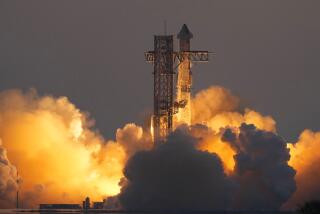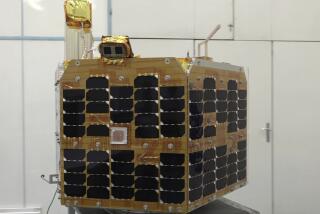Rocket bound for space station blows up just after liftoff
A 13-story rocket bound for the International Space Station exploded just after liftoff Tuesday evening off the coast of Virginia, marking the first time a resupply mission contracted by NASA to a private company has failed.
Orbital Sciences Corp.’s unmanned Antares rocket, which departed from the Mid-Atlantic Regional Spaceport at NASA’s Wallops Flight Facility, was carrying a Cygnus capsule with about 5,000 pounds of supplies and experiments.
The explosion took place seconds after the rocket’s launch at 6:22 p.m. Eastern time. Nobody was injured, but the craft and the flight facility sustained significant damage, officials said.
A few hours later, Orbital and NASA officials said at a news conference they had no early indications of what caused the problem.
Frank Culbertson, Orbital’s executive vice president, said that after things “began to go wrong,” a safety officer sent a destruct command to the rocket. He could not say how much of the explosion was caused by the failure and how much was caused by the intended self-destruction.
The financial toll of the failure is not yet clear. The rocket itself cost more than $200 million, Culbertson said. Officials are waiting for the fire at the launch site to die down before they examine the damage there. Culbertson said Orbital will not fly again before the root cause of the problem is found and fixed.
A team led by Orbital is handling the investigation. It will examine telemetry from the brief flight as well as video, Culbertson said.
The explosion followed a “flawless countdown,” Mission Control in Houston said on NASA’s live video feed of the launch and its aftermath. “The team was not tracking any issues,” a NASA official said.
Meanwhile, the space station astronauts are in no danger of running out of food or other crucial supplies, NASA said.
The two-stage Antares rocket, powered by engines from Aerojet-General Corp. in Sacramento, was to undertake its third resupply mission to the International Space Station, according to NASA. This was its first night launch.
The mission was originally supposed to launch Monday, but NASA scrubbed that because of a boat in the launch area.
Now that the U.S. space shuttle fleet has been retired, NASA is eager to give private industry the job of carrying cargo and crews, in hope of cutting costs. Meanwhile, the space agency will focus on deep-space missions to send probes to asteroids and Mars.
NASA has a $1.9-billion contract with Dulles, Va.-based Orbital Sciences for eight flights to transport cargo from the newly built Mid-Atlantic Regional Spaceport.
One commercial company, Space Exploration Technologies Corp., has successfully resupplied the space station in four missions. The Hawthorne firm, better known as SpaceX, most recently pulled off the feat last month.
The rocket industry is notoriously difficult to enter and littered with failed projects. Even the best rocket systems often require several attempts before they achieve success.
Although Orbital has acknowledged the hazards of launching a new rocket, the company remained confident about its Antares rocket.
But in 2009 and 2011, Orbital ran into failures with its Taurus XL rocket. On both occasions, the rocket’s protective fairing did not separate properly from the rocket and didn’t allow the satellites it was carrying to reach orbit.
The failures shook the company and led it to name its newest rocket Antares -- instead of Taurus II -- to prevent the public from thinking they were the same.
Part of Orbital’s selling point is the company’s claim it can develop and launch rockets at a fraction of the cost of the current generation of spacecraft.
The Virginia company also has employees in El Segundo and Huntington Beach and at Vandenberg Air Force Base.
Orbital was founded in 1982 and manufactures more than half a dozen small- and medium-class rockets, as well as satellites.
Marco Caceres, senior analyst at the Teal Group, said the explosion will cause people to question whether NASA should be turning to private companies to launch spacecraft.
“There are people in Congress who say NASA should not be relying on private companies,” Caceres said. “Many people will now say, ‘We told you so.’”
But there’s always a chance of failure with rocket launches, he said, whether it’s with a private company or with NASA.
Caceres noted that Orbital has experienced several failures with its Antares and Taurus rocket vehicles. “This is not a good record for Orbital.”
Orbital has been using refurbished Russian rocket engines that were built decades ago. The engines were bought from Aerojet. It is not yet clear whether the explosion was caused by an engine.
Times staff writer Melody Petersen contributed to this report.
For breaking news, follow @raablauren and @JamesQueallyLAT on Twitter.
More to Read
Sign up for Essential California
The most important California stories and recommendations in your inbox every morning.
You may occasionally receive promotional content from the Los Angeles Times.













